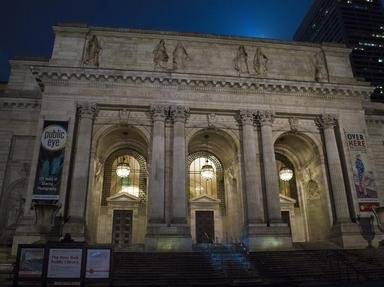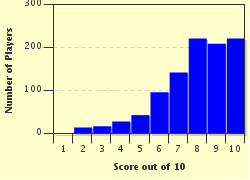Quiz Answer Key and Fun Facts
1. What novel's title echoes a line in "The Battle Hymn of the Republic" and describes a desperate family's struggle with economic injustice as they travel from Oklahoma to California during the Great Depression of the 1930s?
2. A William Faulkner title refers to a line in "The Odyssey" where Agamemnon speaks of his own descent into Hades. What is this Faulkner novel, in which characters narrate from multiple points-of-view the death of Addie Bundren and their journey on foot to carry her body in its coffin to town for burial?
3. What novel by Ernest Hemingway, whose title echoes a poem by George Peele dedicated to Queen Elizabeth I, ends with a character, grief-stricken and disillusioned with war, walking through the rain?
4. What novel by F. Scott Fitzgerald, portraying a glamorous but dysfunctional American couple in the South of France, gets its title from a line in "Ode to a Nightingale" by John Keats?
5. What 1947 Pulitzer Prize winning novel by Robert Penn Warren tells a story of political corruption and assassination, much like that of "Kingfish" Huey P. Long in Louisiana, and alludes in its title to the tale of Humpty Dumpty?
6. What novel by Ernest Hemingway follows its "Lost Generation" characters on a drunken trip from France to Spain but takes its title and epigraph from the Bible, specifically Ecclesiastes 1:4-6?
7. What novel by Edith Wharton, which had "Old New York" as a working title, refers in its published title to a painting of an innocent little girl by Joshua Reynolds?
8. What novel by James Jones, its title repeating a phrase following the words "Gentlemen-rankers out on a spree" in a poem by Rudyard Kipling, deals with the lives and loves of military men in Hawaii on the eve of World War II?
9. Made into a movie starring Robin Williams, what novel by Richard Matheson about a husband's love that transcends death takes its title from a line in William Shakespeare's "Hamlet" in the "To be or not to be" soliloquy?
10. What Margaret Mitchell novel about a spirited Southern woman during the American Civil War takes its title from an Ernest Dowson poem that is addressed not to Scarlet but to Cynara?
Source: Author
nannywoo
This quiz was reviewed by FunTrivia editor
looney_tunes before going online.
Any errors found in FunTrivia content are routinely corrected through our feedback system.


